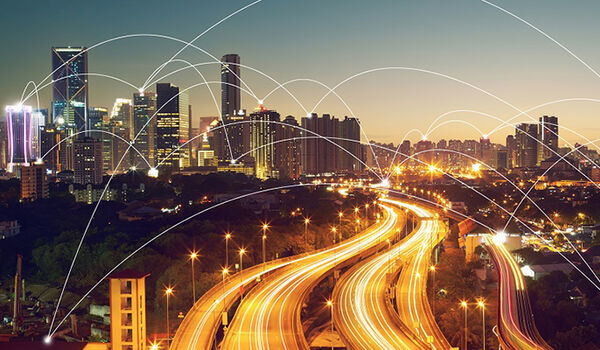How can smart cities become greener?
- Applied Institute for Research in Economics

It is widely accepted that introducing environmental policies is essential for achieving Net Zero. More recent research, however, suggests that digital policies within the spatial context of smart cities (cities that use information and communication technologies to improve efficiencies and solve city-specific problems) are also crucial in helping countries in their mission to nullify carbon emissions and reach Net Zero by 2050.
Typically, firms do not absorb all the costs of the environmental harm they may potentially and inadvertently cause with their operations. Environmental policies that target emissions and penalise polluting firms are required to achieve greater fairness in an economic system. So, environmental policies can be effective in motivating firms to reduce waste and emissions. But such policies could lead to superficial investments in sustainable solutions jeopardising business competitiveness.
Our research reveals that digital policies in the context of smart cities can be aimed at motivating firms to adopt technologies that can instigate investments in substantial sustainable solutions, such as eco-innovations (innovations, whether they be products, processes or institutional structures, that promote sustainability and improve environmental performance). Digital policies include access to infrastructure for the collection, sharing and sophisticated data analysis. Access to such infrastructure supports firms to monitor resource use and waste management more efficiently.
Smart cities can embed the development of distributed energy grids, optimising the use of renewable energy. For instance, embedded in artificial intelligence (AI) and the Internet of Things (IoT), distributed energy grids can improve the efficient use of energy and water, stimulating process eco-innovations, and improve production and distribution efficiencies.
Between 2006 and 2018, we undertook observations in 167 cities in China and looked at variations in green patenting performance (eg the number of successful patents for technology that address environmental challenges) of firms in these cities to capture their eco-innovation performance. We examined changes in these cities that took place over time after implementing the smart city policies and compared smart cities with cities that did not implement such policies. Our focus was particularly on the differential impact of digital policy over and above the impact of environmental policy instruments.
Our results show that both environmental and digital policies encourage eco-innovations. The impact of the dual policies acting in tandem also has a positive effect: environmental and digital policies complement each other and drive eco-innovations.
The role of environmental and digital policies
Policymakers can use environmental and digital policies together to alleviate different types of barriers, such as the high cost of investment in eco-innovations, to a firm’s transition to sustainability. Using both policies could lead to an even bigger impact on eco-innovations compared to implementing the two policies separately. This is because the two policies complement each other, and their joint use can lead to synergistic effects.
Digital policies and technologies integrated within smart cities can facilitate accurate and efficient measurement and monitoring of pollution levels by the government. This enables regulators to increase compliance of firms to environmental regulations. Furthermore, firms seeking to avoid the costs of environmental fines and penalties will have greater incentives to invest in green technologies stimulating green patents.
For example, smart cities with stricter environmental regulations benefit from more efficient atmospheric pollution monitoring via sensor networks compared to ground monitoring stations. Emission data analysed with AI aids better forecasting and optimisation of resource use (eg energy, water etc). As a result, regulators can make more accurate decisions, identify firms that deviate from desirable environmental standards, and enforce penalty regulations.
Our results highlight the long-term impact of environmental and digital policies on eco-innovations. Combining the two policies can steer cities to a path for sustainable development. Our analysis focuses on eco-innovations as they are captured in patents, which are highly relevant for manufacturing industries. It is worth noticing that focusing on manufacturing may miss out the impact on the sustainability of any other changes instigated by smart cities, such as smart governance and any changes in consumer behaviour (eg energy choices within households).
An effective avenue for achieving Net Zero is the creation of public digital infrastructure (such as AI and IoT) and building the expertise to overcome implementation barriers. Future policies can focus on building sophisticated AI to facilitate the process of innovation and problem-solving.
AI can offer tools to perceive solutions that exceed the capabilities of existing cognitive search tools, eg Natural Language Processing (NLP) focuses solely on linguistics and is used to analyse data produced by social data sources. Cognitive search is based on AI and uses a language-independent approach to analyse structured and unstructured data from different sources, which is very important, particularly for addressing complex problems such as sustainability. (Sustainability is so complex due to the intricate and interrelated nature of social, economic, and environmental factors that must be considered simultaneously.)
In conjunction with environmental policies, digital policies can play a critical role in achieving sustainability by helping to balance and optimize these factors in a way that supports long-term viability. By leveraging digital technologies, it becomes possible to monitor and manage complex systems, identify areas for improvement, and implement more effective solutions.
Read the paper: “Are smart cities green? The role of environmental and digital policies for Eco-innovation in China”, Despoina Filiou, Effie Kesidou, Lichao Wu, World Development Volume 165, May 2023, 106212
Contact us
If you would like to get in touch regarding any of these blog entries, or are interested in contributing to the blog, please contact:
Email: research.lubs@leeds.ac.ukPhone: +44 (0)113 343 8754
Click here to view our privacy statement. You can repost this blog article, following the terms listed under the Creative Commons Attribution-NonCommercial-NoDerivatives 4.0 International licence.
The views expressed in this article are those of the author and may not reflect the views of Leeds University Business School or the University of Leeds.

